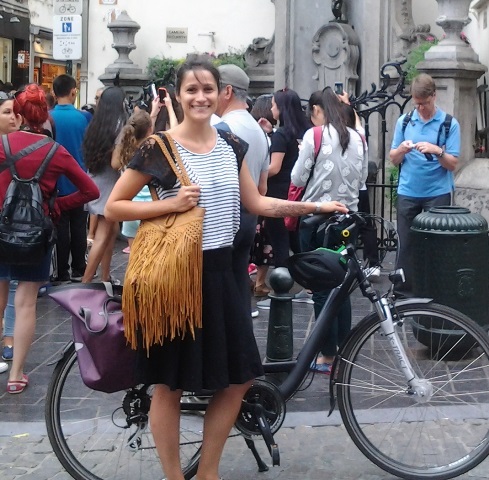URBACT Action-Planning Networks kick-start their 2nd phase!
Edited on
21 June 201920 Action-Planning Networks have been approved by the URBACT Monitoring Committee. Altogether, they gather 216 partners, mainly cities but also a few universities and other local authorities entities. They will work on very varied issues, ranging from the integration of migrants to city centre retail, urban agriculture and sustainable mobility.

Every partner taking part in these networks will work until June 2018 on developing their own Integrated Action Plan. Following the URBACT method, such a plan should be built with all stakeholders concerned by the issue; and it should also bring together different facets of the issue – social, economic and environmental.
The URBACT Summer University that will take place in Rotterdam on 24-26 August will be a key moment for all the cities taking part in the programme to learn and test methods to build an Integrated Action Plan: how to identify and define clearly the issue at stake? how to involve different groups of stakeholders? How to measure impact? These are some of the questions that are necessary to tackle when drafting an action plan, and that will be taught during the Summer University.
Beyond helping cities to successfully deliver on their action plans at the local level, URBACT is also mindful of the wider European context and of the set-up of an urban agenda for the EU. The outline of URBACT networks below will show plenty of opportunities to feed in this European initiative, namely in the already running partnerships on housing, poverty, migration and air quality.
PROJECT | SHORT DESCRIPTION | LEAD PARTNER COORDINATOR |
|---|---|---|
Rehabilitating underused landmark buildings and sites and promote strategic uses of these premises, not only oriented on private exploitation interests, but also in interests of the common good. | NAPLES (IT) Nicola MASELLA | |
Rethinking Agrifood Production in Small and Medium-sized Cities to both boost opportunities for the labour marke and SMEs development, as well as to contribute to urban-rural linkages. | BAENA (ES) Raquel MORENO | |
Managing different migration patterns and a rapid change in the population structure. Dealing with interactions between individuals and social groups in cities in relation to the migration and integration issue. | AMADORA (PT) Ana Paula LUIS | |
Improving capacities of public administrations to boost social innovation ecosystems through participation, open innovation and entrepreneurship | GDANSK (PL) Magdalena SKIBA | |
Establishing a collaborative public service model in order to meet increasing expectations from citizens and stakeholders, societal challenges, and budget cuts. | EINDHOVEN (NL) Yvonne Blankwater | |
Bringing Innovation in the centres of smaller cities to retain local retail, attract businesses and create employment. | SAN DONA DI PIAVE (IT) Giulio ANTONINI | |
Facing major problems of urban mobility by developing sustainable urban mobility strategies in a comprehensive and co-productive process for a time scope of 10-15 years. | BIELEFELD (DE) Olaf LEWALD | |
Exploring how to tap into the cities’ economic power by encouraging local purchasing and spending with local businesses: how procurement can be used more effectively to bring local economic, social and environmental benefit to cities. | PRESTON (UK) Tamar REAY | |
Identifying mechanisms and approaches overcome or mitigate risks associated with deployment of smart city technologies. | MANCHESTER (UK) Mark DUNCAN | |
Renewal and sustainable management of dismissed military areas in urban environment to foster social inclusion and cohesion | PIACENZA (IT) Gloria CERLIANI | |
Addressing the challenges posed by rapidly increasing freight movements within the context of all urban logistics and stimulating the low carbon urban freight sector. | WESTMINSTER (UK) Charlotte KNELL | |
Supporting creative and innovative entrepreneurs from the Y Generation by developing tailor-made cooperation models between science, local government and business | POZNAN (PL) Iwona MATUSZCZAK-SZULC | |
Exploring how digital, social media and user generated content can improve today´s urban management | GENOA (IT) Cesare TORRE | |
To enhance cities competitiveness and job creation capability by positioning them in the new economic landscape according to their specialisation strategies | BILBAO (ES) Eva SALCEDO PEREZ | |
Exploring the practice of temporary use of vacant sites to identify its long-lasting effects and the way in which it influences local governments in planning and decision making processes. | GHENT (BE) Emma TYGADT Ariana TABAKU | |
Increasing cities resilience and sustainability by applying the innovative governance approach of Transition Management. | ROTTERDAM (NL) Rieke KOSKAMP | |
Fostering the revitalization of city centres in medium-sized cities through innovative retail strategies that will enhance the competitiveness of small and/or independent retail businesses. | IGUALADA (ES) Àngels CHACON | |
Increasing densities within the city borders instead of expanding the urban territory by uncovering new planning practices, processes, instruments and partnerships | ANTWERP (BE) Isabelle VERHAERT | |
Exploring how small and medium sized cities can maximise the job creation potential of the digital economy and how businesses can access the digital skills needed to grow and compete. | BARNSLEY (UK) Tracey JOHNSON | |
Using innovative urban design and planning tools to combat social exclusion through the redesign of public spaces in deprived residential areas. Using the power and common language of sport through innovative urban sport actions, physical equipment and better orchestrated service delivery. | LOULE (PT) Nunes Hugo Miguel GUERREIRO |
 Submitted by Soraya Zanardo on
Submitted by Soraya Zanardo on
